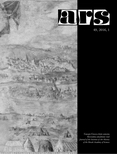
Journal ARS 49 (2016) 1
Eva FRIMMOVÁ
Bratislava in the Late 15th and Early 16th Century in the Light of Habsburg Policy
(Summary)
Bratislava, which was granted the privileges of a free royal city in 1291 by the Hungarian king Andrew III, became a site of high international politics in the latter half of the 15th and in the early 16th century. That was a period of permanent rivalry between the two most significant dynasties in the region of Central Europe: the Habsburgs and the Jagiellonians. In the early 16th century they were joined in their struggle for Hungarian throne by John Zapolya, the most significant representative of national policy in Hungary. Individual members of the aforementioned dynasties found themselves on the Hungarian throne for different periods of time, depending on various circumstances, hereditary proceedings and elections in order to meet the requirements of Hungarian legal system. For the longest period of time, between 1490 and 1526, the throne was occupied by the Jagiellonians: Vladislaus II and Louis II. The paper outlines a political background of major international events, diplomatic talks and their results. It also describes their cultural and social environment. The analysis of individual contracts, literature and archival materials of that time clearly shows that life in Bratislava was strongly influenced by the initiatives of the Habsburgs, in particular the emperors Frederick III and Maximilian I, a founder of a modern Habsburg monarchy. In the early 16th century two dates come to the fore, which really had a strong impact on life in Bratislava: - July 22, 1515: on this date an important political as well as cultural and social event took place in Vienna: a double wedding of descendants of the Habsburg and the Jagiellonian dynasties. - In 1526, after the Battle of Mohacs, medieval Kingdom of Hungary ceased to exist and the power was seized by John Zapolya and Ferdinand I of Habsburg who fought for the throne. After Zapolya’s death in 1540, Ferdinand I finally became the king of Hungary.